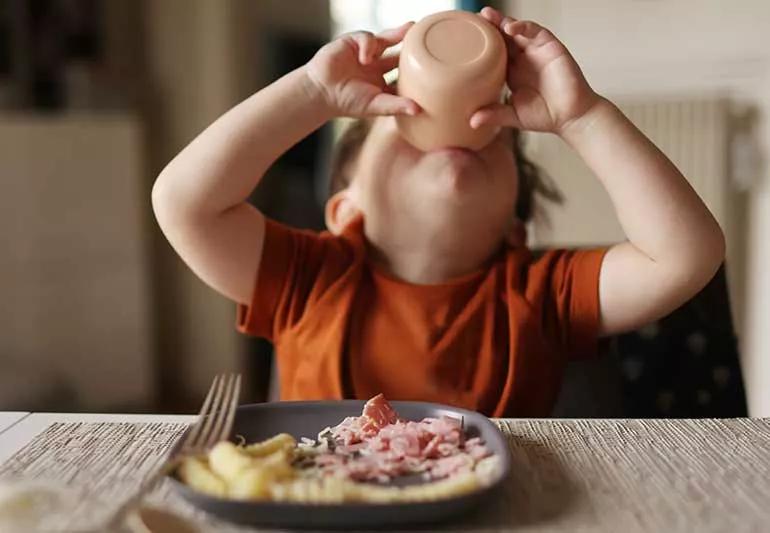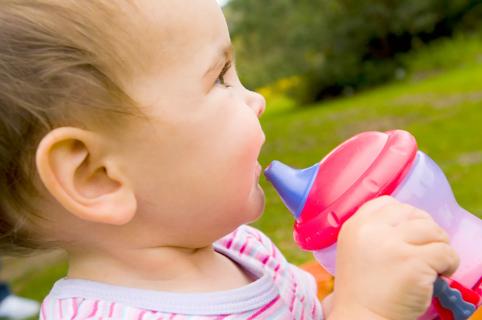They aren’t unhealthy, but they’re probably a waste of money

If you’ve been wandering the baby aisle in your local grocery store recently, you may have noticed they stock beverages labeled specifically for toddlers. But they aren’t the same as infant formula, and they aren’t medically prescribed nutritional supplements.
Advertisement
Cleveland Clinic is a non-profit academic medical center. Advertising on our site helps support our mission. We do not endorse non-Cleveland Clinic products or services. Policy
And — because shopping for your children isn’t complicated enough — the language we use to define these toddler drinks is … well, a little on the slippery side.
We spoke to pediatric dietitian Jennifer Hyland, RD, CSP, LD, to get clarity about what these beverages are, what they aren’t and whether or not they’re worth pouring your savings into.
Toddler drinks — also referred to as toddler milks or toddler nutrition drinks — are powdered products that are usually sold by baby formula companies. Toddler milks are marketed specifically for children ages 12 to 36 months who are transitioning from breast/chest or formula feeding to solid foods.
Like the baby formula they’re supposed to help children transition away from, toddler milks tend to be quite pricey.
If that’s what toddler drinks are, what aren’t they?
Toddler drinks are not the same as the supplemental nutrition drinks for children that may be prescribed by your doctor to help with growth. These products usually come pre-mixed in a variety of flavors and are used as medically necessary for children with specific medical needs. Supplemental nutrition drinks should only be used if your doctor or dietitian recommends them. These drinks are higher in calories than powdered toddler drinks and regular milk.
Advertisement
Now that we have a working definition of toddler drinks, it’s time to talk about the claims their manufacturers make. Are these “transitional drinks” actually necessary for your little one? Or are we reinventing the wheel, when we could just give our kids good old-fashioned whole milk?
Hyland doesn’t pull any punches when it comes to the science around toddler nutrition drinks. “There is no literature to support the claim that toddler milks are necessary or warranted for a developmentally neurotypical child,” she states.
In other words, if your child is eating a regular diet and consuming age-appropriate solid foods, there’s no reason they should need a toddler drink.
“After age 1, most children can meet all of their nutrient needs with a balanced mix of whole milk, fruits, vegetables, protein, grains and healthy fats,” Hyland says. “If you’re concerned that your child isn’t eating with enough variety, you can use a standard multivitamin to cover most of what the toddler drinks aim to accomplish. Even in the pickiest eaters, I don’t usually recommend these powdered toddler drinks.”
Parents are often surprised to learn that toddler drinks actually have the same protein and calories as whole milk! That being the case, Hyland notes that “If you feel like your child needs extra calories, there are other ways to do so, and a toddler drink would not be the answer.”
Hyland isn’t the only expert who doesn’t see the value in toddler drinks. In 2023, the American Academy of Pediatrics (AAP) released a report stating that toddler drinks — which they refer to as Older Infant-Young Child “Formulas,” or OIYCFs — have no nutritional value.
Like Hyland, the AAP concluded that toddler drinks are safe to incorporate into a varied, healthy diet, but don’t provide “a nutritional advantage in most children over a well-balanced diet that includes breast milk (preferred) and/or cow milk.” The report goes on to say that this family of products, which are more expensive than cow milk, have “no specific role in the routine care of healthy children.”
But what if your child isn’t developmentally neurotypical or “healthy”? What if your child was a preemie or has a chronic illness like Crohn’s disease?
“Discuss that with your physician or dietitian,” Hyland advises. “Whether or not they need additional supplementation or toddler milks could be very specific to that individual child, but I still rarely recommend them.”
Toddler milks aren’t beneficial to the majority of children, but the only damage they’re likely to do is to your wallet.
Hyland notes that there are some occasions — like when a child is underweight — when a supplemental drink may be just what the doctor ordered. But remember: Toddler milks or drinks aren’t the same thing as supplemental nutrition drinks. And, importantly, toddler milks don’t stimulate healthy weight gain. In fact, they don’t provide any more calories than whole milk!
Advertisement
“Sometimes, parents think, ‘Oh, toddler milks will give them an extra boost,’” Hyland says. “It does give them some extra vitamins, minerals and essential fatty acids. But it doesn’t give them extra calories, so I would not say that a toddler drink is going to lead to or encourage obesity, necessarily.”
Hyland encourages you to speak to your pediatrician or registered dietitian. They can give recommendations for an appropriate oral supplement to promote growth.
At this point you may be asking yourself: “If toddler drinks don’t aid the transition to solid foods and don’t facilitate weight gain, what’s in that powder, exactly?”
It’s a good question.
Hyland doesn’t see toddler nutrition drinks as necessary for the majority of children, but she’s not poo-pooing their ingredients either. They do provide more nutrients than whole milk alone, and most don’t have added sugar.
“There are a lot of vitamins, minerals and essential fatty acids in toddler nutrition drinks,” she says. “So, there’s nothing in them that I’m concerned with.” However, she’s quick to note that context matters.
“It could be risky to give fortified toddler drinks to a kid who’s eating a regular diet and taking a multivitamin. In that case, they could be overdosing on certain vitamins and minerals.”
Advertisement
We talked earlier about the difference between toddler milks and supplemental nutrition drinks. As a reminder, supplemental nutrition drinks are typically premixed and flavored. Most of them are manufactured by companies that make nutritional drinks for adults, too.
Unless specifically recommended for your child by their doctor or a pediatric dietitian, Hyland advocates skipping them.
“The pre-mixed drinks are higher calorie than milk and they contain added sugar, which, while indicated for some, aren’t necessary for most kids. If your child does need a supplement drink, a dietitian will help you work out how to optimize them in your day so your child still learns to eat solid foods.”
Toddler drinks might not encourage obesity or contain any dangerous ingredients. But does that make them a good buy?
Frankly, it depends why you’re buying them.
If you’re buying them with the expectation that they’ll have a significant impact on your child’s health, it isn’t worth the money.
If you would sleep a little easier knowing that your picky child is getting full nutrition, it may be worth the extra cost.
Ultimately, Hyland considers this less a question of health and more a question of personal preference.
Advertisement
“If a parent feels inclined to give their child toddler milks, I wouldn’t advise against it,” Hyland clarifies. “They certainly will not harm the child, but you can find the same thing in a multivitamin if nutrient variety is your main concern.”
Do toddler drinks re-invent the wheel that is whole milk and food? Sort of, yeah. Does that wheel still turn? Yeah, it does. As long as your child is eating a varied diet, you can’t go wrong.
If only all parenting decisions were that simple.
Learn more about our editorial process.
Advertisement

In babies under 12 months old, cow’s milk has been associated with gastrointestinal bleeding

No juice until your child is 1 year old — and even then, they shouldn’t have much, if any

Ultimately, the choice depends on what works best for you and your baby, but it’s also important to be aware of the pros and cons of both

Ideally, you want your toddler to be drinking from a ‘big kid cup’ by age 2

Letting your baby feed themself foods the whole family enjoys has its benefits — but stick to softer foods and follow safe-eating guidelines

Levels are generally low, but there are ways to minimize potential health risks

Slowly introducing cow’s milk (or soy milk) can help your child make the change

In babies under 12 months, honey may cause a serious illness called infant botulism

The tropical fruit is a good source of antioxidants and vitamin C

Most people fall asleep within 10 to 20 minutes, but if your experience is different, adjusting your sleep schedule may help

Exploring your hidden side can lead to better understanding of what makes you tick